To pilot innovative and sustainable solutions to power milk refrigeration and processing units using renewable energy sources
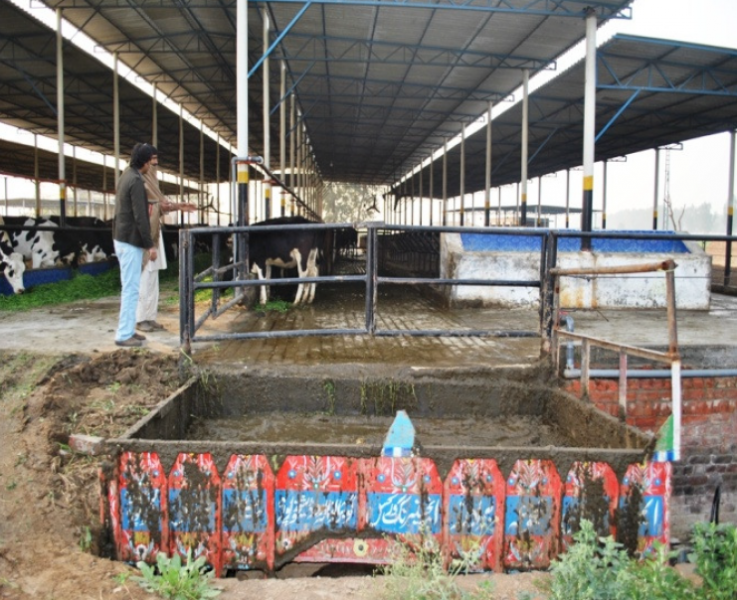 The project was based in Pakistan, which is the fourth largest milk producer in the world and the biggest milk producer in Southern Asia. Currently, it is estimated that only 3% to 5% of Pakistan's total milk production is processed and sold through formal channels. The main reason for the low processing rate is the shortage of milk chilling facilities at farms. Due to this lack of storage facilities the evening milk, which represents a significant portion of the total volume, cannot be properly marketed, which results in lower returns for dairy farmers.
The project was based in Pakistan, which is the fourth largest milk producer in the world and the biggest milk producer in Southern Asia. Currently, it is estimated that only 3% to 5% of Pakistan's total milk production is processed and sold through formal channels. The main reason for the low processing rate is the shortage of milk chilling facilities at farms. Due to this lack of storage facilities the evening milk, which represents a significant portion of the total volume, cannot be properly marketed, which results in lower returns for dairy farmers.
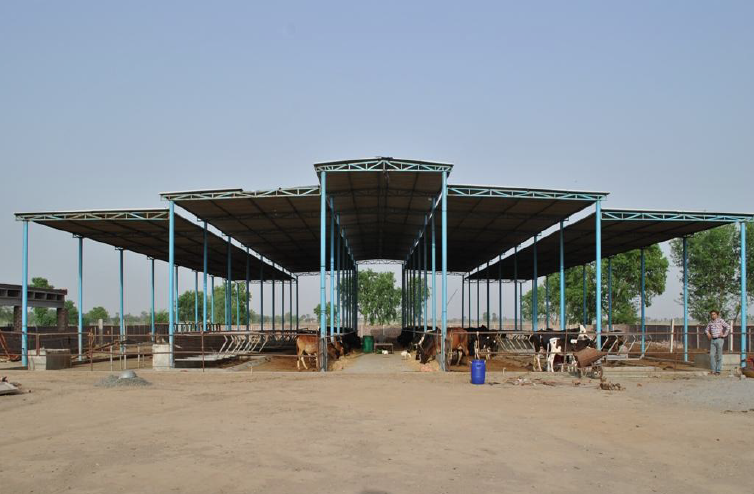 In order to address this problem, milk processors have built strong partnerships with dairy farmers and have provided them with milk chillers on a loan-based system. As there is a shortage of grid electricity these milk chillers are powered, at least partially, by diesel generators. Due to the high cost of diesel, Nestlé also pays the farmers a chilling cost per litre when the generator has to be used. To lower these energy costs and, at the same time, reduce the negative environmental side effects of diesel generators at the dairy farms, Winrock International suggested that biogas could be used as an alternative power source for milk chilling. To demonstrate to dairy farmers and milk collection companies that biogas-generated electricity is a viable alternative to diesel, Winrock implemented this demonstration project. Applying a sector-wide approach the project team worked with dairy farms, milk-processing companies and biogas companies. The feasibility of installing biogas plants was assessed at farm level, while the possibilities of investing in chilling units powered by biogas was discussed with the milk processing companies. At the same time, improvements were made to the capacity of the biogas construction companies to design and construct quality biogas plants.
In a follow-up phase, the outcomes of the project implementation were reviewed, including the operational performance of the biogas plants, successful practices and possible challenges, sustainability impact and overall evaluation of the project activities. More information can be found at the bottom of this page.
In order to address this problem, milk processors have built strong partnerships with dairy farmers and have provided them with milk chillers on a loan-based system. As there is a shortage of grid electricity these milk chillers are powered, at least partially, by diesel generators. Due to the high cost of diesel, Nestlé also pays the farmers a chilling cost per litre when the generator has to be used. To lower these energy costs and, at the same time, reduce the negative environmental side effects of diesel generators at the dairy farms, Winrock International suggested that biogas could be used as an alternative power source for milk chilling. To demonstrate to dairy farmers and milk collection companies that biogas-generated electricity is a viable alternative to diesel, Winrock implemented this demonstration project. Applying a sector-wide approach the project team worked with dairy farms, milk-processing companies and biogas companies. The feasibility of installing biogas plants was assessed at farm level, while the possibilities of investing in chilling units powered by biogas was discussed with the milk processing companies. At the same time, improvements were made to the capacity of the biogas construction companies to design and construct quality biogas plants.
In a follow-up phase, the outcomes of the project implementation were reviewed, including the operational performance of the biogas plants, successful practices and possible challenges, sustainability impact and overall evaluation of the project activities. More information can be found at the bottom of this page.
Technology, Operations and Maintenance
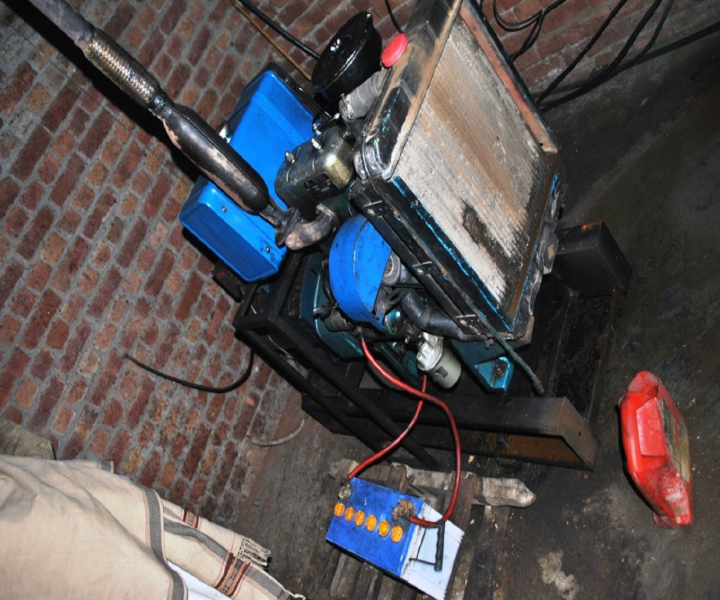 The project has facilitated the installation of 4 biogas plants: 2 plants of 50m3 and 2 plants of 100m3. Three plants were installed on farms that each had around 100 cows and one was installed in a community where each villager owns a small number of cows. The smaller biogas plants can produce about 32kWh of electricity and the bigger plants about 64kWh, which is sufficient to run milk chillers with capacities of 500l (12kWh) and 1,000l (20,8 kWh) for 8 hours. The additional electricity generated is used to run other farm equipment such as fodder cutters or fans, or is used for lighting purposes.
To ensure the long-term viability of the biogas plants, the project also supported the development of an after-sales service and guarantee from the biogas construction companies. In addition, an operations and maintenance manual was developed, which was provided to the construction companies and the farmers as a guideline to the daily operation of the biogas plants and electricity use.
The project has facilitated the installation of 4 biogas plants: 2 plants of 50m3 and 2 plants of 100m3. Three plants were installed on farms that each had around 100 cows and one was installed in a community where each villager owns a small number of cows. The smaller biogas plants can produce about 32kWh of electricity and the bigger plants about 64kWh, which is sufficient to run milk chillers with capacities of 500l (12kWh) and 1,000l (20,8 kWh) for 8 hours. The additional electricity generated is used to run other farm equipment such as fodder cutters or fans, or is used for lighting purposes.
To ensure the long-term viability of the biogas plants, the project also supported the development of an after-sales service and guarantee from the biogas construction companies. In addition, an operations and maintenance manual was developed, which was provided to the construction companies and the farmers as a guideline to the daily operation of the biogas plants and electricity use.
Financial Issues and Management
In order to select the project sites, feasibility assessments of 12 dairy farms were conducted. Based on the assessment, 4 farmers decided to install biogas plants. The others 8 farms opted out because they did not have available finance to make the high upfront investment required for the biogas units. The 4 farms that installed the biogas units received subsidies of about US$1,000 for the larger plants and US$800 for the smaller plants. Milk chillers and electric generators were provided by Nestlé Pakistan Ltd, on the condition that farmers would continue to supply milk to them. The equipment remained the property of Nestlé. Nestlé paid the farmers the standard chilling cost of US$0.01/l and an additional biogas incentive of US$0.0125/l. The payback period for the farmers to recover their investment costs is anticipated to be around 3 years.Environmental Issues
In terms of environmental benefits, the project contributed to the reduction of GHG emissions in two ways: by using cattle manure to produce biogas instead of letting it decompose and emit methane into the atmosphere and by replacing diesel with biogas as the fuel source for the electricity generators. In addition, the residue from the anaerobic process is rich in nutrients and can be used as an effective organic fertilizer.Social Issues
As well as the implementation of the biogas systems, the project also focused on enhancing the capacity of biogas construction companies and developing communication channels and relationships between milk processors, potential dairy farms, biogas construction companies and financial institutions. Two workshops were organized for capacity-building: one targeted the management staff, supervisors and engineers and focused on biogas plant design, quality, construction, operations and maintenance. The second workshop focused on training 4 builders in the actual construction of the biogas plants.Results & Impact
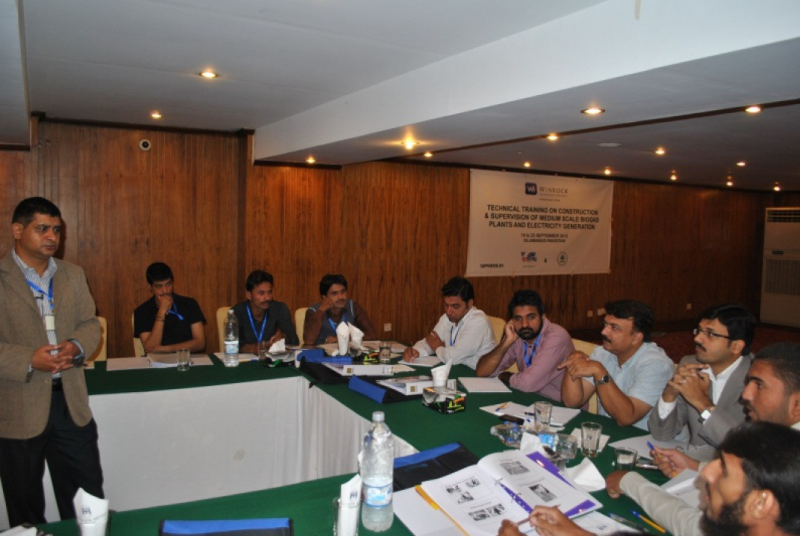 This project facilitated the installation of 4 biogas plants to ensure energy security at farm level. This resulted in increased income for farmers as they were able to chill their own milk at their farms and could, therefore, sell more milk to the milk processing companies. In addition, GHG emissions were reduced through manure management and the replacement of diesel by biogas.
Above and beyond these direct results, the project had positive impacts on the dairy sector in terms of increased awareness of biogas technology and the development of partnerships between farmers, financial institutions and the milk marketing companies.
This project facilitated the installation of 4 biogas plants to ensure energy security at farm level. This resulted in increased income for farmers as they were able to chill their own milk at their farms and could, therefore, sell more milk to the milk processing companies. In addition, GHG emissions were reduced through manure management and the replacement of diesel by biogas.
Above and beyond these direct results, the project had positive impacts on the dairy sector in terms of increased awareness of biogas technology and the development of partnerships between farmers, financial institutions and the milk marketing companies.
Replicability
In Pakistan there is a general need to increase the availability of milk chilling facilities at farm and community level and also to secure the electricity supply for existing and potential new milk chilling facilities. This means that this project has, in theory, good replication potential and this potential is further enhanced by the established partnership between farmers and milk processing and marketing companies. This partnership, in combination with the successful demonstration of the technology, has already resulted in the installation of two additional biogas units of 100m3 on a farm belonging to Nestlé. Further replication will rely heavily on the availability of finance for local farmers. Follow-up projects with a modified financing model were already planned following the completion of the project.Lessons Learned
The project demonstrated that key factors for successful implementation were the work undertaken with various stakeholders on different aspects of the problem, as well as the act of bringing these parties together. The structures that already existed between farmers and milk processors were clearly beneficial to this process. Furthermore it was important to raise awareness among the rural population regarding biogas as an energy source for milk chilling. At the same time it was essential to build capacity within the biogas construction companies to assure the quality and, therefore, the durability of the biogas plants. Another critical factor was the high upfront cost of the biogas systems. As there were no appropriate financing mechanisms available to provide the required credit, several farms that were part of the feasibility study decided not to install biogas systems. To overcome this barrier for future projects, Winrock discussed financing options/models with financial institutions, biogas plant producers and milk companies.Follow-Up Phase
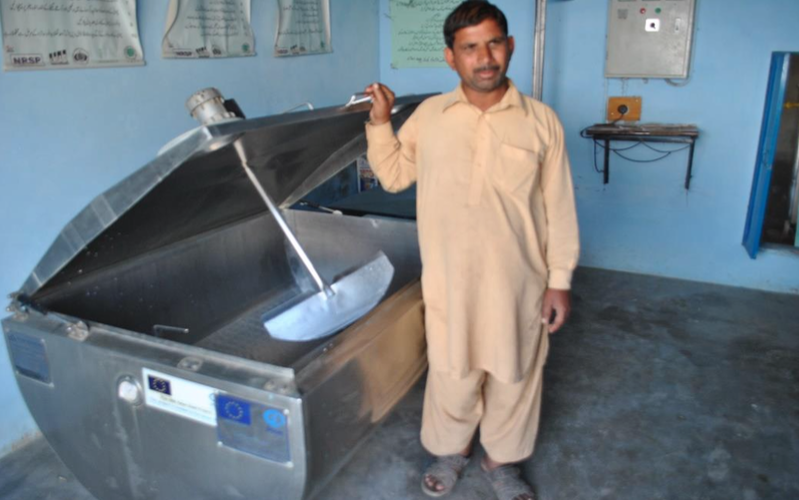 After the successful implementation of the original project from 2012 - 2013, WISIONS supported Winrock in carrying out a technical investigation on the technical outcomes of the previous activities, including information on the operational performance of the biogas plants, possible challenges, capacity building, and more.
Among the lessons learned during the evaluation were the following aspects:
After the successful implementation of the original project from 2012 - 2013, WISIONS supported Winrock in carrying out a technical investigation on the technical outcomes of the previous activities, including information on the operational performance of the biogas plants, possible challenges, capacity building, and more.
Among the lessons learned during the evaluation were the following aspects:
- The applied designs proved technically adequate for the conditions of the targeted dairy farms
- To ensure a sustainable operation, the biogas plants need to be located close to water sources and elevated off the ground (in case of floods)
- A significant share of diesel and LPG consumption can be displaced by the new technology, which leads to monetary savings ranging from 300,000 to 640,000 PKK per year, depending on the digester size
- The addition of bio-slurry to irrigation water proved to be beneficial, leading to less need for chemical fertilizers while providing higher tolerance to diseases
- The identification of measures required to ensure that transport tasks (manure, water, bio-slurry) can be adequately fulfilled on a daily basis
- The quality and appropriate installation of monitoring devices, particularly gas flow meters
- The motivation of users towards book keeping and daily recording of key parameters
- The monitoring and tuning of devices like generators, gas flow meters, biogas filters, pressure gauges, etc. should be fully integrated into the regular operation and maintenance routines
Projects with same technology
Powering a village sustainably: generating electricity from waste-based biogas
To facilitate access to electricity in rural communities through community enterprises that generate electricity by using local sources.
Biogas Generation through Biomass Production in a "Smart School" in the Lower Northern Region of Thailand
The aim of this project is to use food and agricultural waste, as well as animal dung, to generate biogas energy for producing/cooking school lunches at seven schools in Thailand.
Projects in same country
Micro Hydro Power Resource & Services Centre in Chitral, Pakistan
This project aims to improve the reliability and sustainability of micro hydro power plants in Chitral, Pakistan.